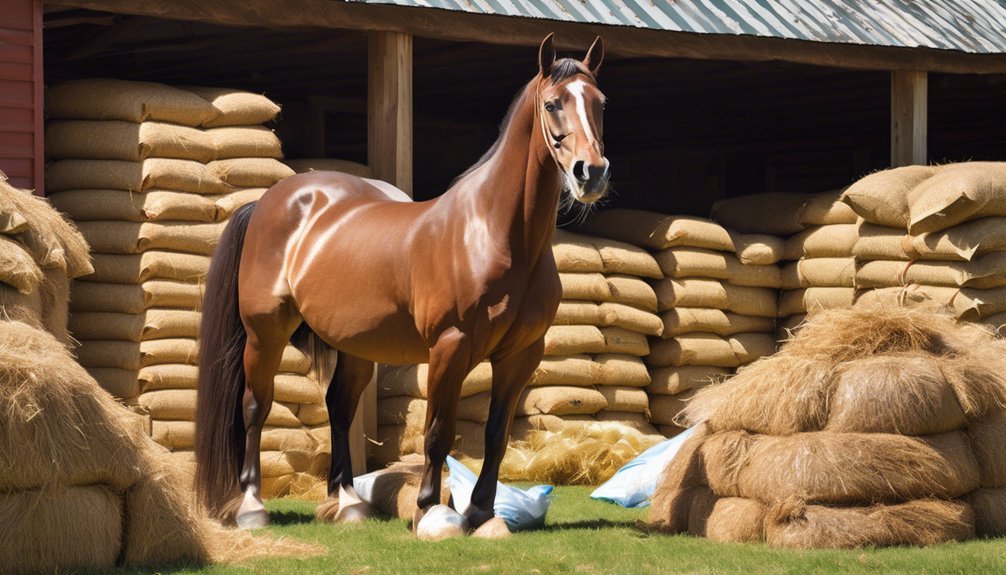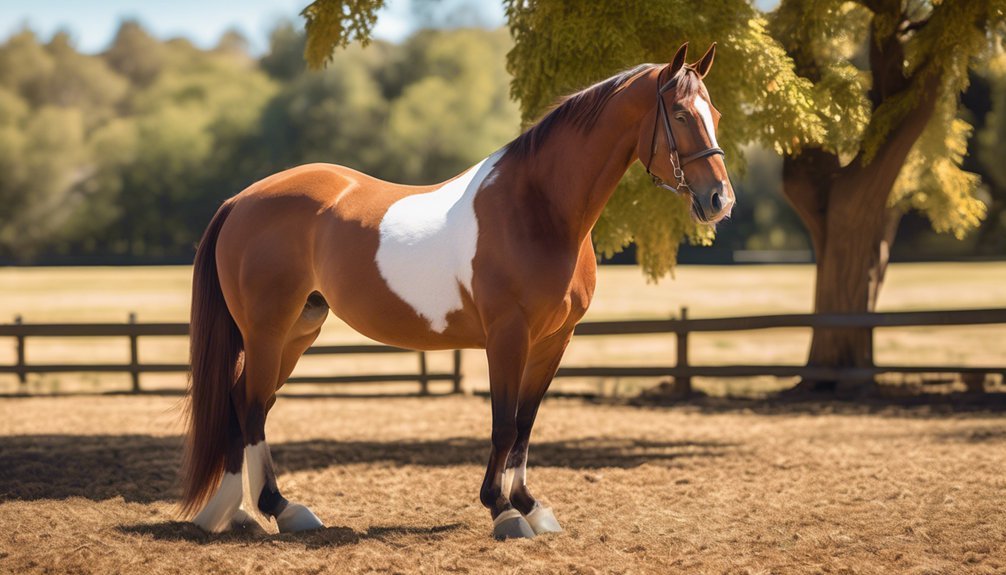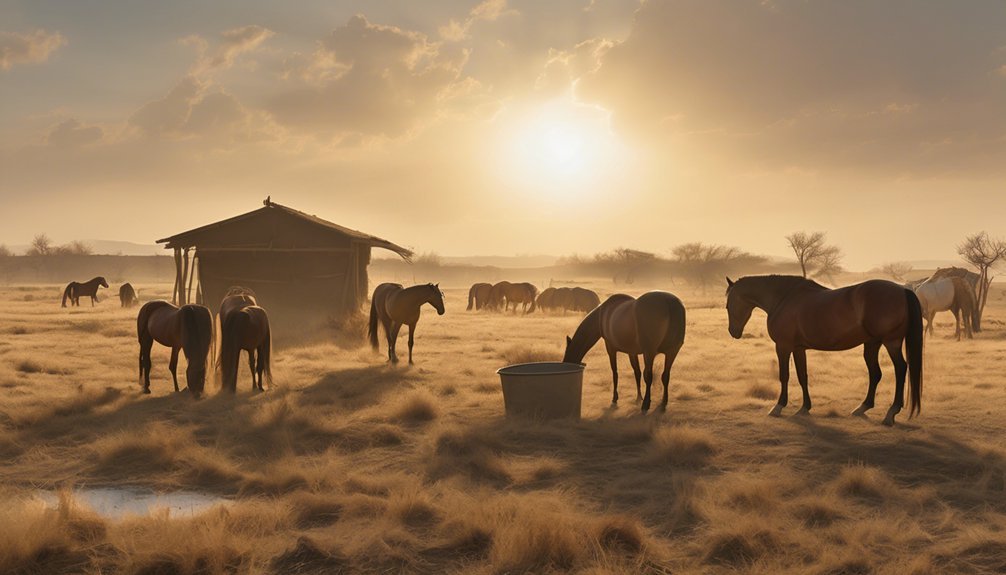
Did you know that up to 70% of a horse's muscle mass is influenced by proper nutrition? To optimize muscle development in performance horses, it's crucial to understand the role of protein, vitamins, and minerals in their diet. However, many owners overlook the balance of caloric intake and nutrient quality. Let's explore best practices that can elevate your horse's performance and muscle growth effectively.
Key Takeaways
- Provide high-quality protein sources like alfalfa hay and soybean meal to support muscle growth and overall health in performance horses.
- Ensure a balanced intake of essential vitamins and minerals, particularly calcium, phosphorus, and B vitamins, for optimal muscle function and energy metabolism.
- Monitor caloric intake and maintain a slight surplus to promote muscle development while avoiding excessive fat gain, adjusting based on activity levels.
- Implement customized feeding programs that include a variety of forages and frequent, smaller meals to enhance nutrient absorption and digestion.
- Consider supplements such as amino acids and omega fatty acids to further support muscle development and overall performance in horses.
Understanding Equine Muscle Development

Equine muscle development is a complex process influenced by genetics, nutrition, and exercise. Understanding equine physiology is crucial for promoting optimal muscle growth.
Your horse's muscle fibers are primarily composed of two types: slow-twitch and fast-twitch. Slow-twitch fibers support endurance activities, while fast-twitch fibers are vital for explosive strength and speed.
When you engage your horse in targeted exercises, you stimulate the growth of these fibers, enhancing overall muscle development. Nutrition plays a key role here; providing a balanced diet ensures your horse receives the necessary nutrients to support this process.
The Importance of Protein in Horse Nutrition
Protein is a crucial building block in horse nutrition, playing a vital role in muscle development and overall health. To support your horse's growth and performance, it's essential to prioritize quality protein sources. The efficiency of digestion also matters; some protein sources are absorbed better than others.
Here's a quick comparison of common protein sources:
| Protein Source | Digestion Efficiency | Ideal Use |
|---|---|---|
| Alfalfa Hay | High | General maintenance |
| Soybean Meal | Moderate | Muscle building |
| Oats | Low | Energy boost |
| Beet Pulp | Moderate | Weight gain and energy |
Essential Vitamins and Minerals for Performance Horses

To optimize performance and health in horses, it's crucial to ensure they receive a balanced intake of essential vitamins and minerals.
Vitamin A, for instance, supports vision and immune function, while B vitamins play a key role in energy metabolism. You'll want to include vitamin sources such as leafy greens and high-quality grains in their diet.
Minerals like calcium and phosphorus are vital for bone strength and muscle function, but maintaining the right mineral balance is equally important to prevent deficiencies or toxicities.
Microminerals, like zinc and copper, also contribute to overall well-being.
Caloric Requirements for Muscle Growth
When it comes to muscle growth, understanding caloric requirements is essential for any horse owner. Your horse needs a proper energy balance to build muscle effectively.
To achieve this, focus on high-quality caloric sources, such as grains and forages rich in protein and fat. These nutrients provide the necessary energy for muscle repair and growth.
It's crucial to assess your horse's body condition and activity level regularly; this will help you adjust caloric intake accordingly. Remember, a slight caloric surplus can encourage muscle development, while an excess may lead to unwanted fat gain.
Designing a Customized Feeding Program

A customized feeding program is key to meeting your horse's unique needs for muscle development. Focus on feed types that provide a balanced mix of carbohydrates, proteins, and fats. Incorporate a variety of forage to enhance nutrient balance and ensure your horse receives essential vitamins and minerals. Meal timing plays a crucial role; feed smaller, more frequent meals to optimize digestion and energy absorption.
| Feed Element | Importance |
|---|---|
| Forage Variety | Enhances nutrient diversity |
| Nutrient Balance | Supports muscle growth |
| Meal Timing | Optimizes digestion |
The Role of Supplements in Muscle Development
While many horse owners focus on diet alone, supplements can play a crucial role in enhancing muscle development. You'll find several supplement types beneficial, including amino acids, electrolytes, and omega fatty acids.
Amino acids, particularly branched-chain amino acids, directly support muscle repair and growth. Electrolytes help maintain hydration and muscle function, while omega fatty acids can reduce inflammation and improve recovery times.
When considering supplements, it's essential to follow dosage guidelines based on your horse's weight, activity level, and specific needs. Consulting with a veterinarian or equine nutritionist can help ensure you're providing the right balance.
Monitoring Body Condition and Performance

Monitoring your horse's body condition and performance is vital for optimizing muscle development and overall health. Regularly assessing your horse's body score using a standardized scale helps you identify any changes in fat or muscle.
This evaluation should be part of your routine, along with performance tracking during workouts or competitions. Keep notes on how your horse moves, performs, and responds to different feeding regimens, as these insights can guide your nutritional choices.
Adjustments to their diet might be necessary to support muscle growth and recovery based on these observations. By staying attentive to both body condition and performance, you'll ensure your horse thrives and reaches its full potential in training and competition.
Tips for Feeding Before and After Workouts
To optimize your horse's performance and recovery, proper feeding before and after workouts is essential.
For pre workout nutrition, provide a balanced meal 1-2 hours prior, focusing on easily digestible carbohydrates and moderate protein. This fuels energy and enhances endurance. Avoid heavy feeds that can cause discomfort during exercise.
After workouts, prioritize post workout recovery by offering a nutritious mix of electrolytes, protein, and high-quality forage within 30 minutes. This replenishes lost nutrients and supports muscle repair.
Remember to keep fresh water accessible, as hydration is crucial for recovery. Tailoring your feeding routine to your horse's individual needs will ensure they perform at their best and recover efficiently, making every training session count.
Frequently Asked Questions
Can Certain Feeds Improve My Horse's Energy Levels for Performance?
Yes, certain feeds can boost your horse's energy levels. Incorporating energy-enhancing grains and performance-boosting supplements can provide essential nutrients, helping your horse maintain stamina and perform at its best during training and competitions.
How Often Should I Feed My Performance Horse Daily?
Research shows horses thrive on feeding frequency of 2-3 meals daily. Spacing meals evenly throughout the day helps maintain energy levels and digestion. Pay attention to meal timing; it's crucial for your horse's performance and well-being.
Are There Specific Feeding Schedules for Different Disciplines?
When considering discipline-specific nutrition, your feeding frequency should align with your horse's energy needs. Different disciplines require tailored nutrient profiles, so adjust meals accordingly to optimize performance and health for your unique equine athlete.
Can I Use Natural Remedies to Support Muscle Development?
Imagine a lush garden; using herbal supplements can nourish your horse's muscle recovery. These natural remedies might support development, but always consult a vet to ensure they fit your horse's unique needs and performance goals.
What Are the Signs of Overfeeding in Performance Horses?
You'll notice signs of overfeeding in your performance horse through overeating behavior, excessive weight gain, and lethargy. Watch for changes in appetite and energy levels, as these can indicate that you're providing too much food.
Conclusion
In conclusion, optimizing muscle development in performance horses requires a tailored feeding strategy. Did you know that a horse's protein needs can increase by up to 50% during intense training? By focusing on high-quality proteins, essential vitamins, and adequate caloric intake, you can significantly enhance your horse's performance. Regularly monitor their body condition and adjust their diet accordingly to ensure they thrive. With careful planning and attention, you can promote optimal muscle growth and overall health in your equine athlete.





